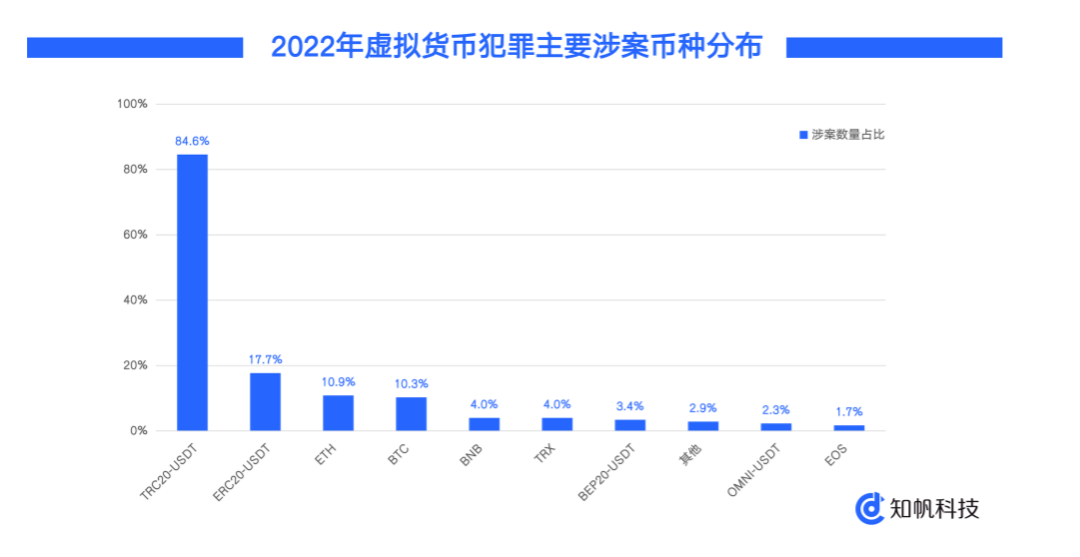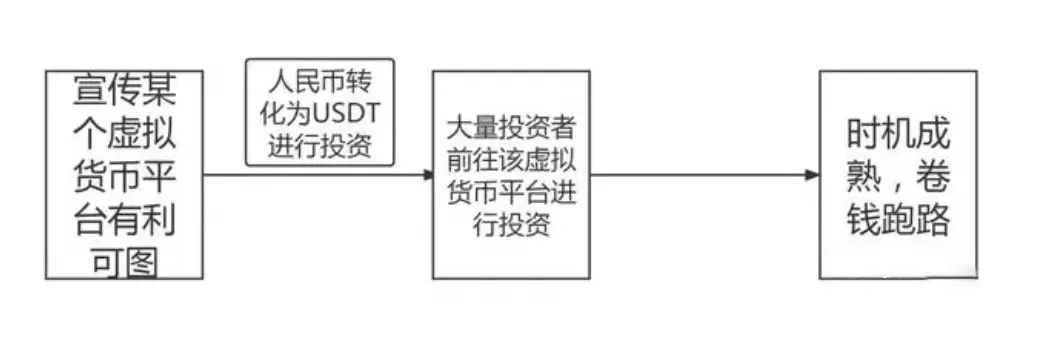As the country further strengthens the regulation of virtual currency trading, multiple virtual currency exchange platforms have closed their C2C trading channels, giving rise to many off-exchange trading activities and consequently leading to numerous illegal and criminal issues.
Recently, the topic of being scammed when buying U has become popular in various WeChat groups, with many members expressing that they know friends who have been swindled out of large sums of money when buying U. According to the "2022 Annual Report on Blockchain and Virtual Currency Crime Trends" by Zhipan Technology, USDT has the highest proportion of involvement in virtual currency crime cases in 2022, occupying an absolute dominant position.
In this article, the author will discuss the various tricks involved in buying and selling USDT and how to avoid falling victim to them.


Cases of U buying and selling scams
Before discussing the tricks, let's take a look at a few real cases to understand how criminals operate.
- Case Min01 Criminal Final 99
In early September 2019, the defendant Gao Xiong purchased a set of "LYS" (Louis) software through the internet, hired the defendant Lan Shiming, recommended the Louis software to the victim Chen, and promoted the profit model of the Louis software, which involved customers spending RMB to purchase USDT on the Huobi app, transferring the USDT to the Louis software, and allowing customers to invest in the software for four rounds a day, with each round lasting 6 hours and yielding a profit of 0.7%. After obtaining the profit, customers would withdraw the USDT back to Huobi and make a profit by selling it. Chen then recommended the software to other victims, Wu and Lin. On December 9, 2019, Gao Xiong prohibited customers from withdrawing USDT through the Louis software backend, preventing them from withdrawing the USDT from the software. Later, Gao Xiong and Lan Shiming, disguised as customer service personnel of the Louis software, suspended the accounts of customers such as Chen for violating the rules of using virtual numbers, and required Wu and Lin to transfer the USDT from the Louis software to Chen's account, increase the investment, and lock the transaction for 15 days. After following the instructions, Chen found that the account was frozen again on December 27, 2019, and the funds could not be withdrawn. Gao Xiong and Lan Shiming then made various excuses to delay the process. Starting from the end of November 2019, at Gao Xiong's instruction, Lan Shiming transferred the USDT from the victims' accounts to Lan Shiming's Huobi account for cashing out, ultimately transferring the funds to Gao Xiong's bank account, with Lan Shiming personally profiting 12,000 yuan.
- Case Ji01 Criminal Final 143
The defendant Zhang met Zheng on a blind date website and engaged in USDT trading together. At the end of July 2020, victims Dong and Yan met Zheng, who was selling USDT online, and claimed that the price was 50 cents cheaper than the market price. Dong and Yan decided to buy USDT from Zheng. Subsequently, Zhang, at the instruction of Zheng, went to a hotel in Changchun to defraud Dong and Yan. On August 2, 2020, Zhang showed the amount of USDT in the mobile wallet at the hotel and successfully completed several small transactions as instructed by Zhang. Later, Dong and Yan transferred 1.29 million yuan to a person named Tang Chang, provided by Zheng, for the purchase of 200,000 USDT. Zhang pretended to transfer the USDT using the mobile phone but claimed that there might be a blockchain confirmation issue, calming the victims while receiving instructions from Zheng to escape and leaving Changchun. Afterwards, Zhang paid Zhang 1,500 USDT as a reward.
- "Virtual Currency" Offline Fraud Case in Ningxiang City
In May 2021, the Ningxiang City Public Security Bureau received a report from a Mr. Li, who met someone with the ID "Large Quantity of U" through a chat app and was told that the person had a large quantity of USDT for sale at a low price, supporting on-site transactions and coin verification. Two days later, Li met with Xiang and Lin at a large shopping mall in Ningxiang for the transaction. Xiang and Lin opened a digital wallet app on their phones, showing a large amount of "U coins" in the wallet and claiming that they would conduct the "U coin" transfer within the app. After Li transferred 200,000 yuan as agreed, the other party left for various reasons. According to the investigation, the suspects Xiang and Lin had just turned 18 this year. In early May, the two saw the "Large Quantity of U" ID posting a sale message online and started "taking orders" offline: they posted advertisements for selling "U coins" at a much lower price than the market price to attract investors, with Lin contacting people to meet offline and Xiang showing a large "U coin" balance on the phone app to gain trust, urging the victims to transfer money to their bank accounts, and quickly finding excuses to leave after the transfer. The two made a profit of over 6,000 yuan using this method. Currently, Xiang and Lin have been criminally detained, and the case is still under further investigation.

Common tricks in U buying and selling scams
Behind the aforementioned real cases are two common types of U buying and selling scams: the first involves criminals setting up trading platforms to lure victims to invest and then absconding, while the second involves criminals directly defrauding victims through OTC off-exchange trading.
Trick 1: Investment Fraud (Technical Type)
Investment fraud often involves criminals exploiting the victims' desire to get rich overnight through investment. The main scenario is as follows:
Criminal groups promote a false virtual currency investment platform online or offline, enticing a large number of people to invest in the platform. The platform requires the conversion of RMB into USDT for investment. These platforms are often false apps or websites developed by criminal groups that can manipulate backend data at will. After victims make deposits, the operators of the platform abscond for various reasons (such as server maintenance).
What we commonly refer to as "Ponzi schemes" and "pyramid schemes" also follow the same pattern, luring victims to invest large sums of money in U with the promise of high returns and then embezzling the funds.

Trick 2: OTC Fraud (Direct Type)
In many unsecured OTC off-exchange transactions, some victims fall into the trap of irregular OTC due to their desire for small gains, attempting to buy or sell virtual currency at lower or higher prices, and ultimately becoming victims of scams such as absconding after offline transactions, falsifying transaction details, or disappearing after receiving payment.

Recommendations from Lawyer Mankun
"There are risks in making money, and investment requires caution." If you encounter U buying and selling online, be extremely cautious and do not fall into the trap of criminals for the sake of a small advantage. If you do engage in a transaction, whether it is conducted online or offline, remember to save all chat content, transfer records, etc. in advance. If you do fall victim to fraud, remember to report the case as soon as possible and seek legal assistance!
免责声明:本文章仅代表作者个人观点,不代表本平台的立场和观点。本文章仅供信息分享,不构成对任何人的任何投资建议。用户与作者之间的任何争议,与本平台无关。如网页中刊载的文章或图片涉及侵权,请提供相关的权利证明和身份证明发送邮件到support@aicoin.com,本平台相关工作人员将会进行核查。




